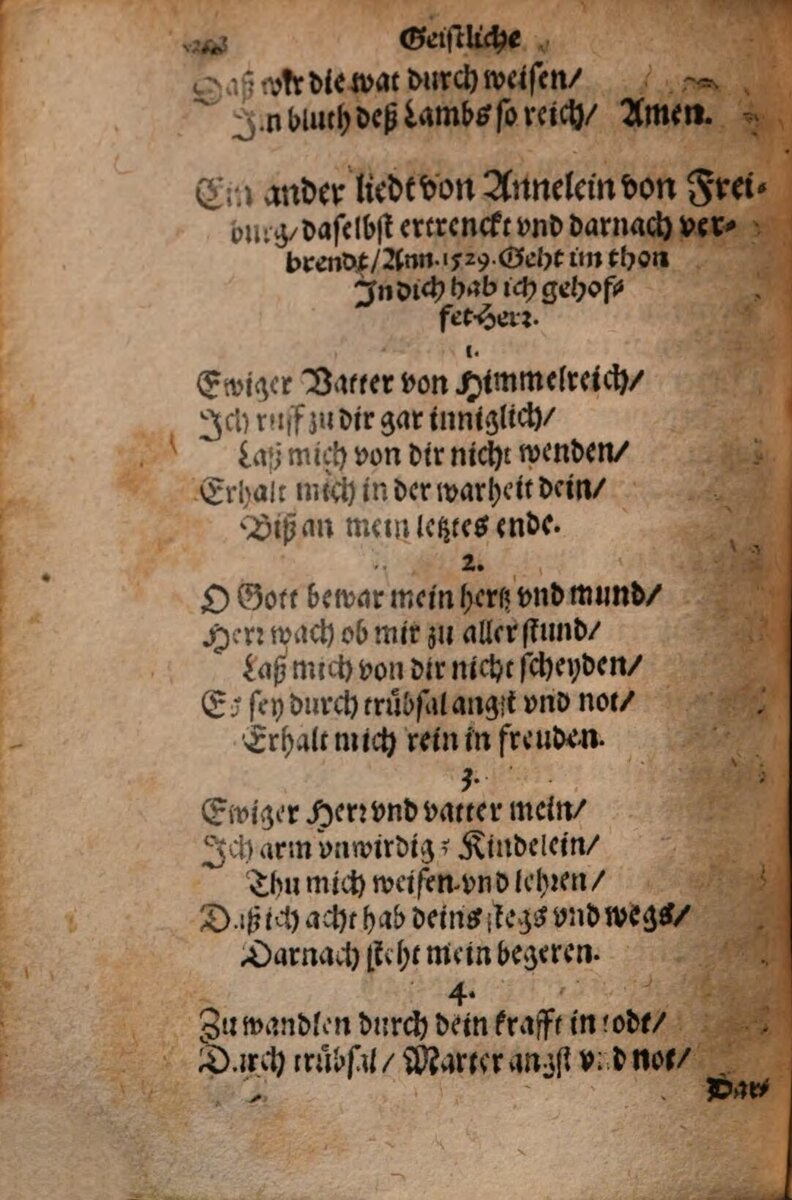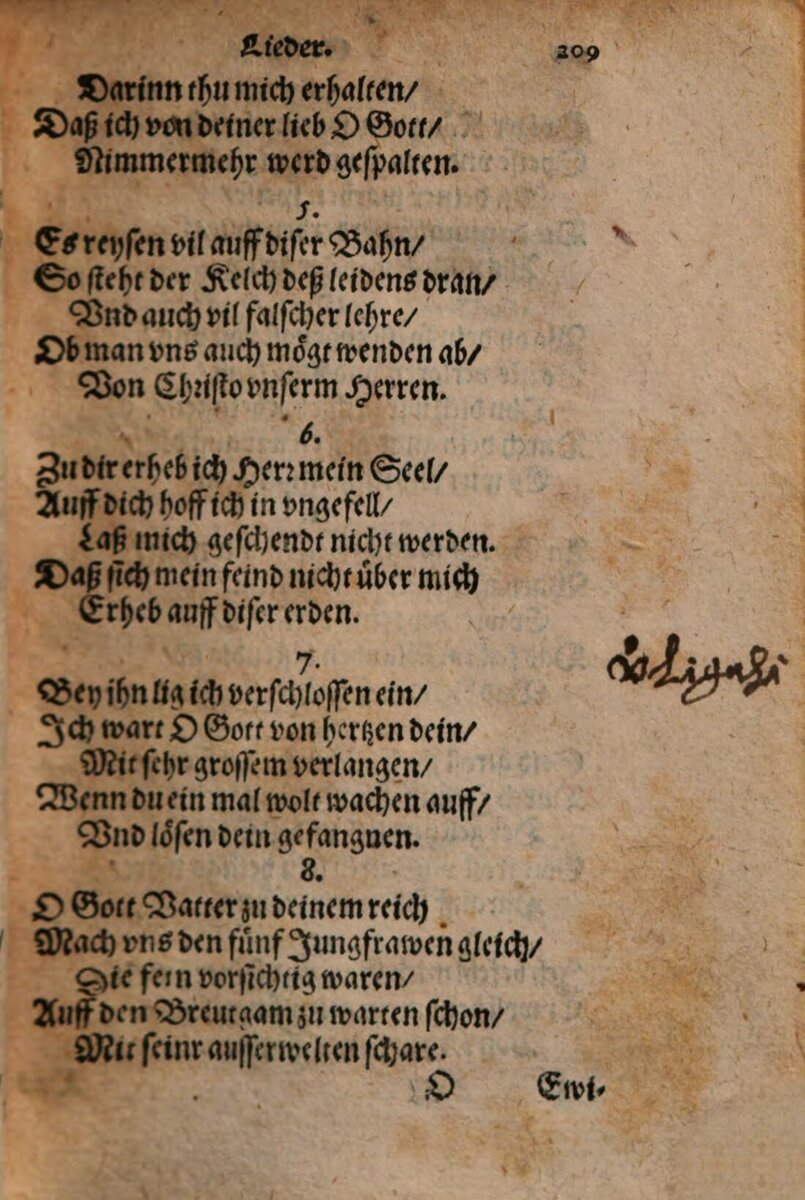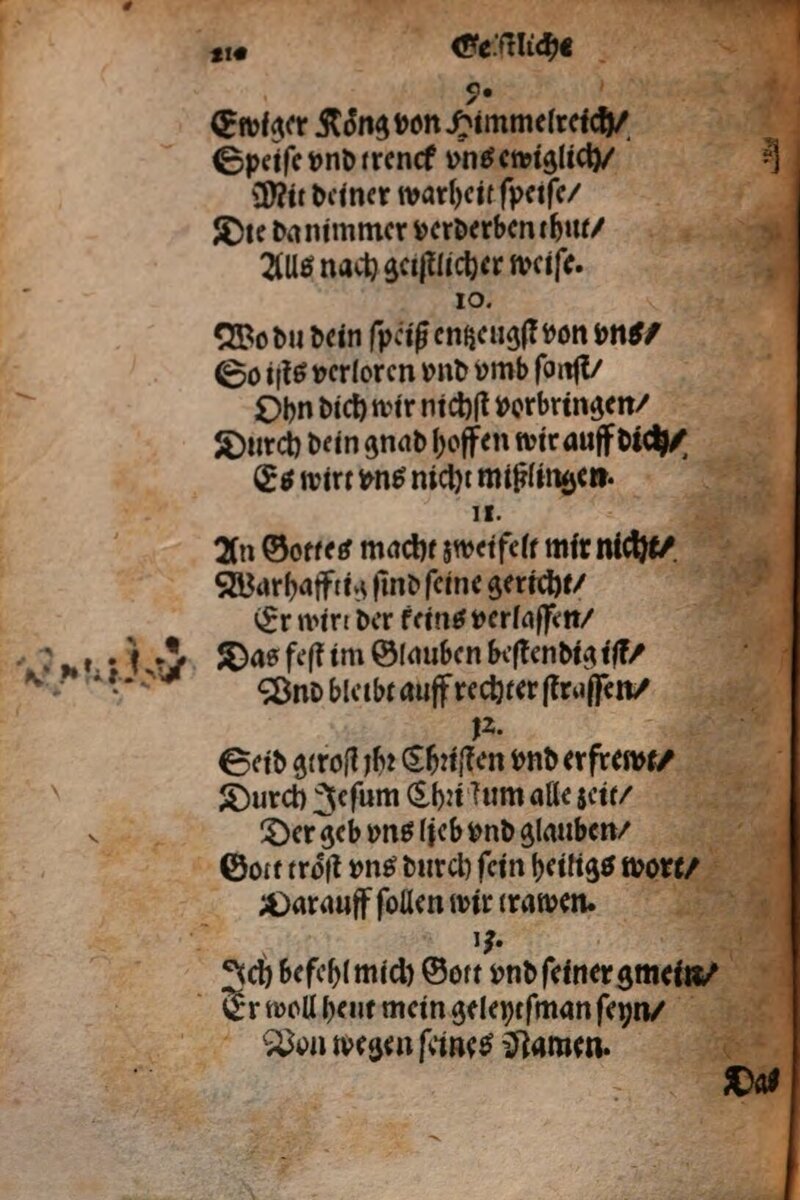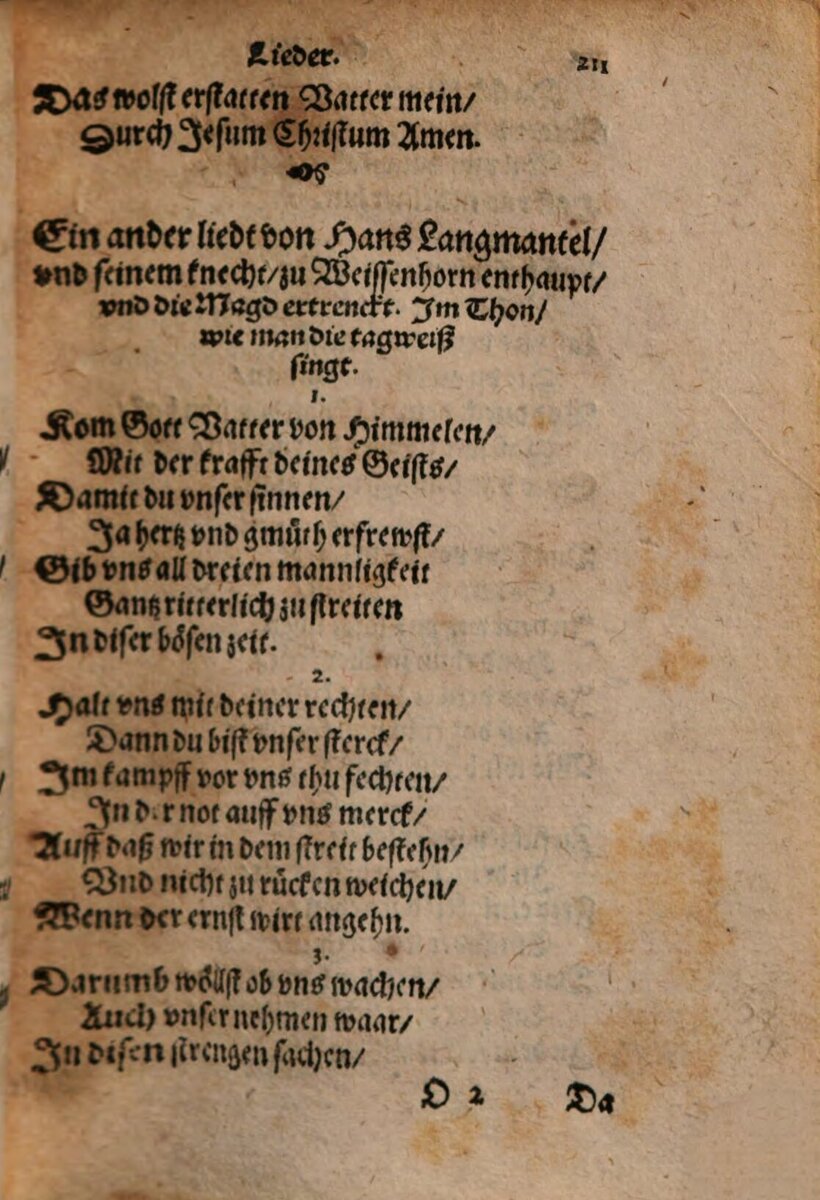Source
Another song of Annelein of Freiburg, Who was Drowned and then Burned, 1529.
[editor’s note: Misattributed, actually by Ursula Helrigel]
To the tune of “In You I Have Hoped, Lord.”
Everlasting Father in heaven,
I call on You so ardently,
Do not let me turn from You.
Keep me in Your truth
Until my final end.
O God, guard my heart and mouth,
Lord watch over me at all times,
Let nothing separate me from You,
Be it affliction, anxiety, or need,
Keep me pure in joy.
My everlasting Lord and Father,
Show and teach me,
Poor unworthy child that I am,
That I heed your path and way,
In this lies my desire.
To walk through your power into death,
Through sorrow, torture, fear, and want.
Sustain me in this,
O God, so that I nevermore
Be separated from Your love.
Many travel along this road,
The cup of suffering lies there,
And also many untrue teachings
Which try to turn us away
From Christ our Lord.
To You I raise up my soul, Lord,
I depend on You in misfortune,
Do not let me come to harm,
That my enemy not stand over me
On this earth.
They have imprisoned me.
I wait, O God, with all my heart,
With very great longing,
When finally You will awake,
And set Your prisoners free.
O God, Father, make us like
The five virgins of Your kingdom
Who were prudently careful
To wait for the bridegroom
With His chosen flock.
Eternal king of heaven,
Feed us and quench our thirst
In a spiritual way
With Your food of truth
Which never perishes.
If you withhold Your food from us
Everything is lost and useless.
Without You we bring forth nothing.
Through grace we trust in You,
It will not fail us.
I do not doubt God’s power.
His judgments are all true.
He will not abandon anyone
Who stands firm in the faith,
And stays on the true paths.
Be comforted you Christians and rejoice,
Through Jesus Christ forevermore,
Who gives us love and faith.
God comforts us through His holy word,
On that we should rely.
I entrust myself to God and His church.
May He be my protector today,
For the sake of His name.
May this come to pass, Father mine,
Through Jesus Christ, Amen.
Another beautiful sacred song written by a young noblewoman, Walpurga of Pappenheim.
To the tune of: “Out of Deep Distress”
Oh pious heart, so glorify,
And give praises to your Lord,
Be mindful He is your father
Whom you should honour always
Without Him there is not one hout
With all the worry in your mind
That your life can be nourished.
He is the one who loves you from His heart,
His blessing He shares with you,
Forgiving You of Your misdeeds
And healing you of your wounds,
Arming you for the spiritual war,
So Satan no overcome you,
And disperse all of your treasures
He is merciful and so good
To the poor and destitute,
Who turn from all their arrogance,
And convert to His truth.
He accepts them like a father,
Seeing that they reach the end
Of the true path to salvation.
How like a true father He bends,
Doing good to His children,
God has opened Himself to us
Blessing us poor sinners.
He has loved us and has graced us,
Forgiving us our trespasses,
Making us victorious.
And He gives us His good Spirit
Which renews all of our hearts,
Through this we fulfill His commands,
Although with the pain of love.
He helps our need with grace and healing,
Promising us a glorious share,
Of the eternal treasures.
According to unrighteousness,
He has not recompensed us,
Instead He showed us compassion,
When we should have been doomed.
His mercy and His goodness
Is readied for every one of us
Who love Him from the heart.
What He has begun out of love,
He also wants to finish.
We offer ourselves to God’s grace
With loins that have been girded,
With all we have, even our flesh,
Hoping that, to His praise,
He will change our every way.
Oh Father! Be gracious to us,
While we are in wretchedness,
May our actions be upright,
And come to a blessed end.
Light us all with Your shining word,
So that we can, in this dark place,
Be not beguiled by false light.
Lord God! Accept our praise and thanks,
That we are humbly singing,
Let Your praise sound in us freely,
Let it penetrate our hearts.
Help us that we, with Your power,
Through true spiritual knighthood
May achieve the crown of life.
Amen.
Further reading
Linda H. Huebert Hecht and C. Arnold Snyder, “Ursula Hellrigel of the Ötz Valley and Annelein of Freiburg.” In Profiles of Anabaptist Women: Sixteenth-Century Reforming Pioneers. Edited by C. Arnold Snyder and Linda H. Huebert Hecht. Waterloo, ON, Kanada: Wilfrid Laurier University Press, 1996. pp. 199-201.
Robert Kolb, “Preaching on Luther’s Hymn Texts in the Late Reformation.” Lutheran Quarterly 34, no. 1 (2020): 1–23.
A. J. Ramaker, “Hymns and Hymn Writers among the Anabaptists of the Sixteenth Century.” The Mennonite Quarterly Review 3 (1929): 93–131.
C. Arnold Snyder, “Magdalena, Walpurga, and Sophia Marschalk von Pappenheim.” In Profiles of Anabaptist Women: Sixteenth-Century Reforming Pioneers. Edited by C. Arnold Snyder und Linda H. Huebert Hecht. Waterloo, ON, Kanada: Wilfrid Laurier University Press, 1996. pp. 121-122.
Keith L. Sprunger, “Dutch Anabaptists and the Telling of the Martyr Stories.” The Mennonite Quarterly Review 80, no. 2 (2006): 149–182.
Source of original German text: Ausbund Etlicher Schöner Christlicher Geseng/ wie die in der Gefengnuß zu Passaw im Schloss von den Schweitzern/ und auch von andern rechtgläubigen Christen hin und her gedicht worden. 1583. pp. 208-211; 409-412. Available online at: https://www.digitale-sammlungen.de/view/bsb10207712?page=220



